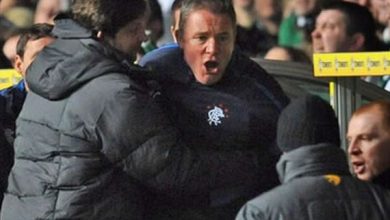Horrendous Scenes Outside Ibrox: Rangers Fans’ Actions Spark Outrage
On May 4, 2025, the iconic Ibrox Stadium, home of Rangers Football Club, became the epicenter of disturbing scenes that have left the footballing world reeling. What should have been a day of passion and rivalry during the Old Firm clash with Celtic descended into chaos, as reports emerged of violent behavior attributed to a section of Rangers supporters. These actions, far removed from the spirit of the game, have reignited debates about fan conduct and the broader responsibilities of football clubs and authorities in maintaining order.
The Old Firm derby, one of football’s fiercest rivalries, is no stranger to heightened emotions. However, the events outside Ibrox on this occasion crossed a line into outright hostility. Social media posts and eyewitness accounts described a volatile atmosphere, with some Rangers fans allegedly engaging in aggressive acts. One particularly shocking report highlighted a banner unveiled by Rangers supporters depicting a man with a shotgun aimed at the Celtic support, accompanied by the words “rebel scum.” Such imagery, provocative and threatening, set a dangerous tone for the day.
Further accounts pointed to objects—including lighters, batteries, and even half-bottles of whiskey—being hurled toward Celtic players, posing serious safety risks. These incidents, combined with reported threats to kill at the match’s outset, painted a grim picture of a fanbase, or at least a faction within it, spiraling out of control. While the majority of Rangers supporters are passionate and law-abiding, the actions of this minority have cast a dark shadow over the club’s reputation.
This is not an isolated incident for Rangers. Recent months have seen the club grappling with fan-related controversies. In April 2025, UEFA issued a suspended closure of the Copland Stand at Ibrox following the display of a “racist and/or discriminatory” banner during a Europa League match against Fenerbahce. The banner, which read “Keep woke foreign ideologies out – defend Europe,” drew widespread condemnation and led to lifetime bans for those responsible. The club itself labeled the display “shameful” and “embarrassing,” urging fans who hold such views to disassociate themselves from Rangers.
Just weeks prior, in Bilbao, hundreds of Rangers fans were involved in a massive brawl ahead of a Europa League tie against Athletic Club. The clashes, which occurred despite warnings from local authorities against “violence and vandalism,” underscored the challenges of managing large traveling supporter groups. Similarly, in January 2025, over 1,500 Rangers fans infiltrated home sections at Old Trafford during a match against Manchester United, sparking violent scenes that prompted a Premier League investigation.
These recurring incidents suggest a troubling trend, one that Rangers and the broader football community must address urgently. The club has faced fines, sanctions, and threats of stand closures, yet the behavior persists among a small but disruptive
Football is a game of passion, but it must never be a platform for violence or hatred. The actions of these Rangers fans—whether throwing dangerous objects, displaying threatening banners, or engaging in physical altercations—are antithetical to the values of sport. They endanger players, fellow supporters, and the reputation of a club with a storied history. As Rangers themselves stated in response to the Fenerbahce banner, “If you do not believe in 2025 that absolutely everyone is welcome to follow Rangers… then Rangers is not the club for you.”
The responsibility lies not only with the fans but also with the club and authorities. Rangers have taken steps, such as issuing bans and condemning discriminatory behavior, but more proactive measures are needed. Enhanced security, stricter ticketing controls, and educational campaigns could help curb the influence of rogue elements. Police Scotland, which implemented a “proportionate policing plan” for a prior Europa League match at Ibrox, must continue to work closely with the club to prevent escalations.
The scenes outside Ibrox on May 4 are a stark reminder that football’s tribalism, while a source of its allure, can tip into something far uglier. The Old Firm derby, a cultural institution, deserves better than to be tainted by such conduct. Fans of all clubs must recognize that their actions reflect not just on themselves but on their team, their city, and the sport as a whole.
Rangers, as a club, have the opportunity to lead by example. By doubling down on efforts to root out problematic behavior and fostering an inclusive environment, they can reclaim the narrative. The majority of their supporters, who create the electrifying atmosphere Ibrox is known for, should not be defined by the actions of a few.
As the dust settles on this latest controversy, one thing is clear: this is no way to act. Football is about unity, competition, and shared joy—not violence or division. It’s time for all involved to ensure that Ibrox remains a fortress of football, not a flashpoint for chaos.





